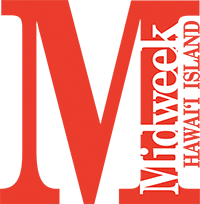There’s Safety In Numbers
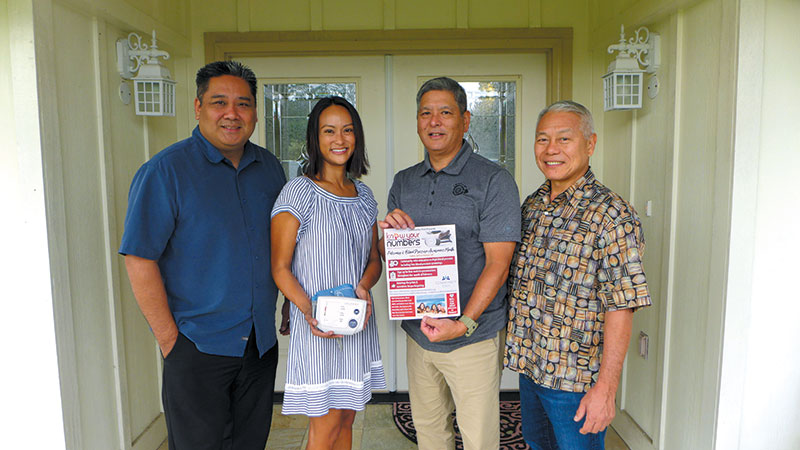
Community First members are eager to get the word out about this month’s campaign. They are (from left) Toby Taniguchi, board chairman; Kim Kobayashi, project manager; Randy Kurohara, project director; and Mike Sayama, executive director.
Community First has launched its Know Your Numbers awareness campaign this month in hopes of taking down one of life’s silent killers: high blood pressure.
Do you know what your blood pressure reading is? If not, you are among the many who are unfamiliar with their systolic and diastolic numbers. This is why the nonprofit Community First has organized its initial Know Your Numbers campaign as part of February’s Blood Pressure Awareness Month, when free worksite presentations and blood pressure screenings are offered.
“The goal is to be as familiar with your blood pressure numbers as you are with your own height and weight,” says Community First executive director Mike Sayama, who adds that interested businesses should call to schedule their readings. (See information on next page.)
The late Barry Taniguchi, former chairman and CEO of KTA Super Stores and the founder of Community First, believed there was no way to transform health care and achieve a sustainable system without coming together, according to Sayama.
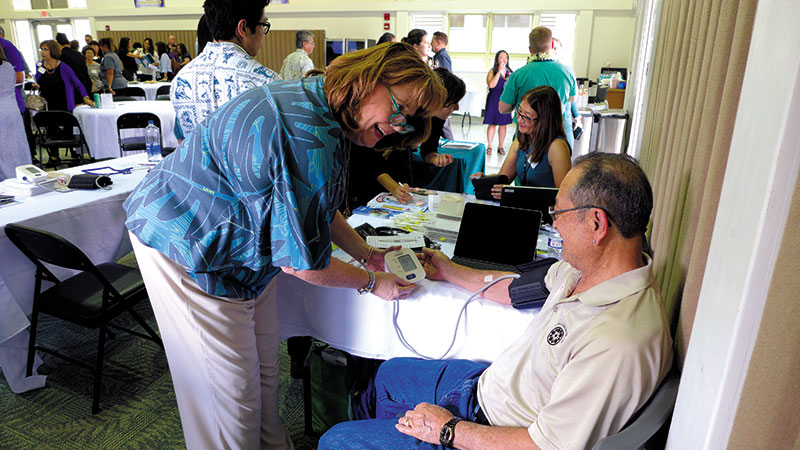
UHA-RN care specialist Jennie Gamage checks Russell Arikawa’s blood pressure at the Know Your Numbers campaign.
“Barry believed that if west, north and east Hawai‘i come together, we can build a county-wide system of health governed by each community to best address their needs,” he says.
Barry’s son, Toby Taniguchi, who has succeeded his father as president of KTA Super Stores and president and chairman of Community First, says his father used to say it was “too late” for him, and early education was imperative when it comes to health.
“High blood pressure is known as the silent killer and leads to heart attacks and strokes,” says Taniguchi. “One out of three people have high blood pressure. We want people to know their numbers and own their health now, before their risk increases.”
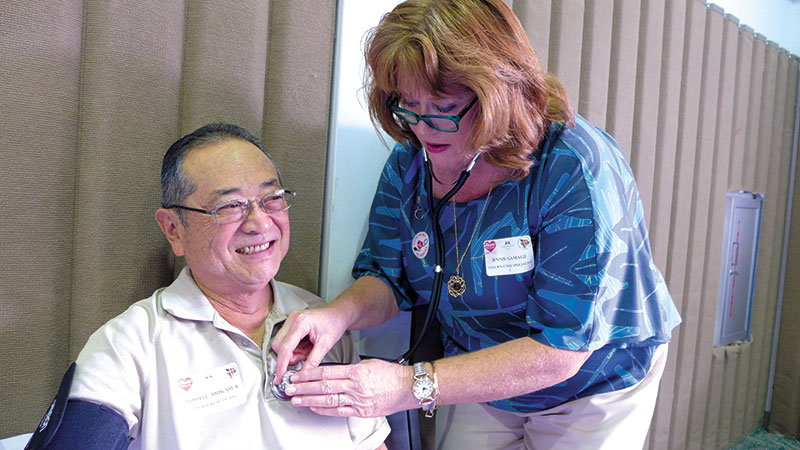
Russell Arikawa smiles after receiving good news about his blood pressure and heart rate from Gamage.
Know Your Numbers will educate the community about high blood pressure and hypertension, which put people at risk for heart disease and stroke — the leading causes of death in the United States.
“Most people do not experience any symptoms or signs, and half of those with high blood pressure are not aware of it,” says Sayama. “Everybody, not only doctors, is responsible for caring for health and the community. We’re trying to do this through community initiatives like the Know Your Numbers campaign and also through changing the business model for how health care is financed.”
Community First is dedicated to developing a community that believes health care is not merely treating disease, explains Randy Kurohara, Community First project director.
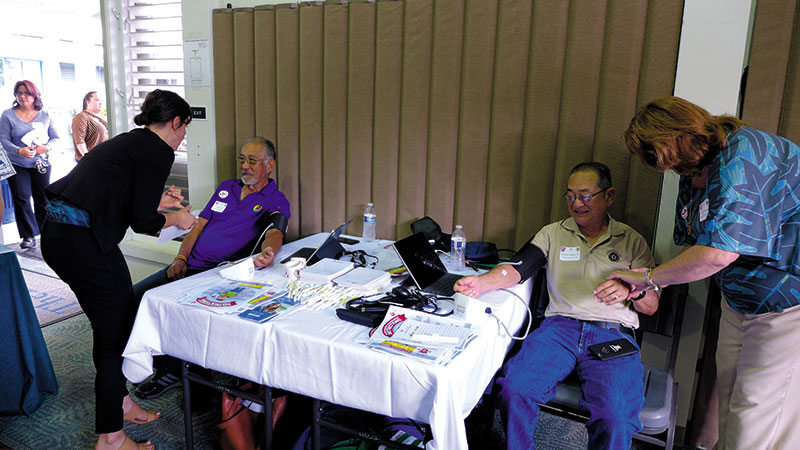
UHA-RN care specialist Audrey Joyce checks Tommy Goya’s pressure.
“We believe that only together as a community can we solve many of the challenges facing our community’s health and improve our ability to provide quality health care services to all our people,” he says. “Having an informed and healthy community is important for many reasons: productivity as an individual, less burden and cost to our health care system, and better quality of life.”
Taniguchi maintains that if you have high blood pressure, you can do something about it.
“The best is exercise, diet and stress management, but there are also inexpensive, generic drugs that work for most people, too,” he says.
Taniguchi says he is working on bringing the campaign to their internal wellness program at KTA Super Stores.
“Our pharmacy staff is also actively involved in some of the educational content we intend to use during the Know Your Numbers campaign.
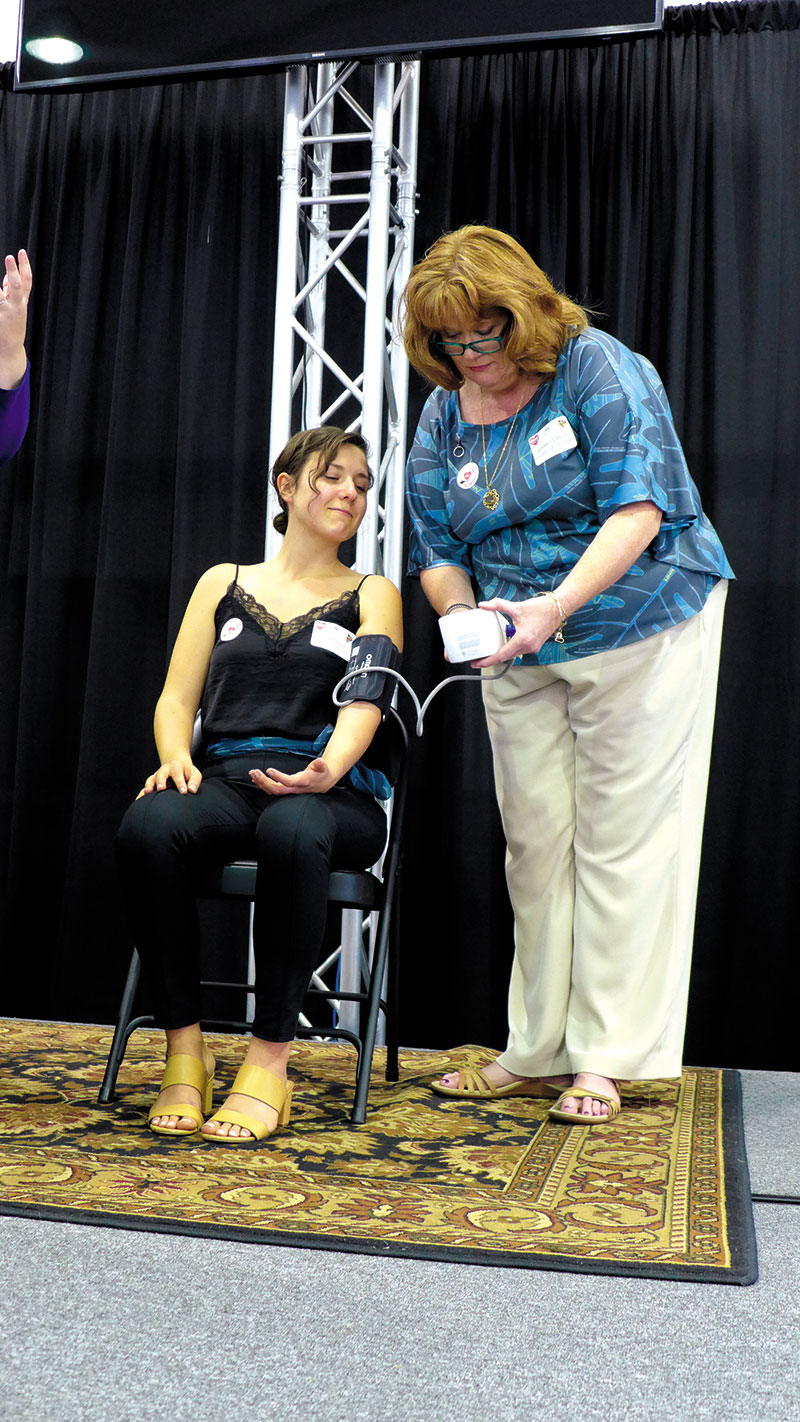
Gamage demonstrates how to take blood pressure on fellow UHA-RN care
specialist Audrey Joyce.
“My hope is that this brings the community together to focus on a significant health issue and makes us believe that, in working together, we can make a positive difference. I think this will be one of many initiatives that get us to the tipping point where we all realize that health care is about taking care of health, not just treating disease,” he says.
Adds Kurohara, “We want to have an informed and healthy community where people are taking more responsibility for their own health. Over time, our goal is to end high blood pressure in Hawai‘i.”
Throughout the month of February, Community First will do educational outreach and free blood pressure screenings at work sites and community venues in East Hawai‘i, in partnership with several additional organizations, including East Hawai‘i Independent Physicians Association, American Heart Association, Hawai‘i Island Chamber of Commerce, Kanoelehua Industrial Area Association, Japanese Chamber of Commerce, County of Hawai‘i, State of Hawai‘i, Hilo Medical Center, Hawai‘i Community College, University of Hawai‘i at Hilo School of Nursing, KTA Pharmacy, HMSA, UHA and others.
“The challenges we face are big and complex. We need a place where all stake-holders can be at the table and share their concerns and contributions. Community First serves as a catalyst for solutions to improve health and lower medical costs on Hawai‘i Island,” Taniguchi says.
To learn more about Community First and/or schedule your workers for blood pressure readings, visit communityfirsthawaii.org or ownyourhealthhi.org, or call 756-9637. Gamage demonstrates how to take blood pressure on fellow UHA-RN care specialist Audrey Joyce.
